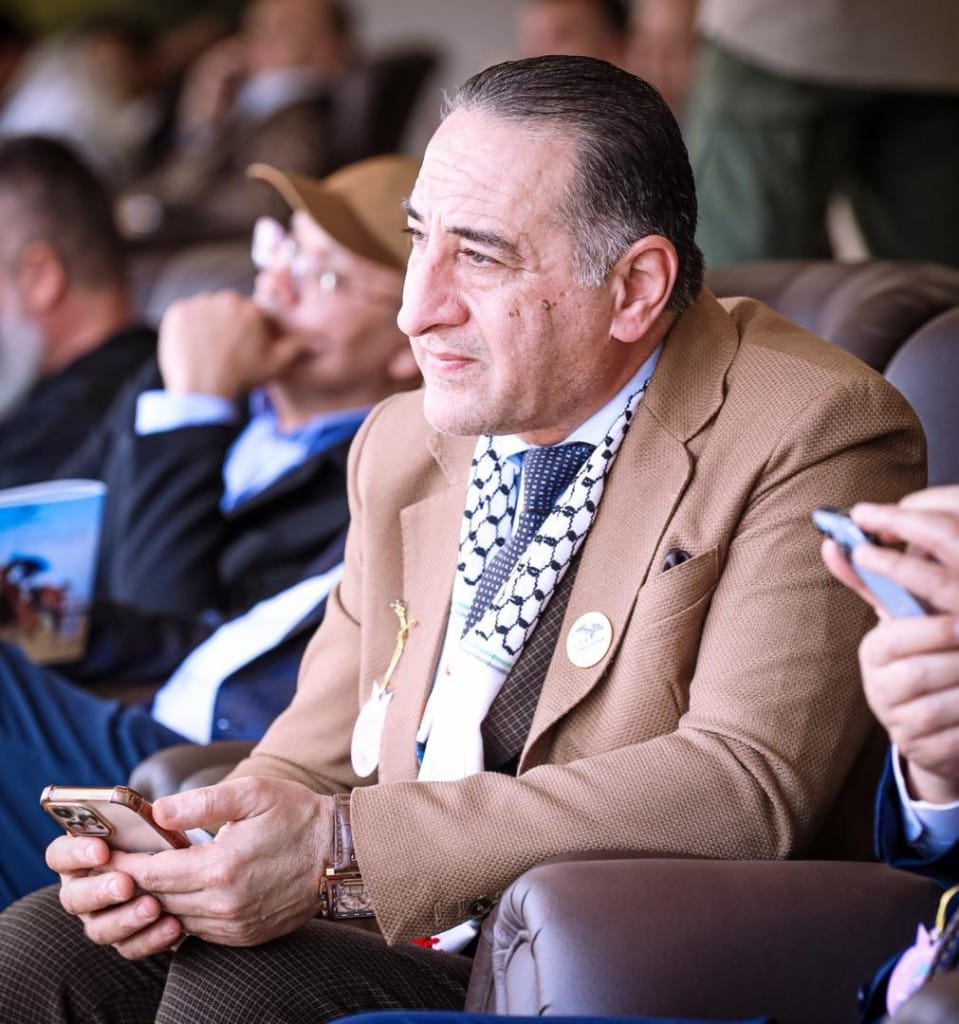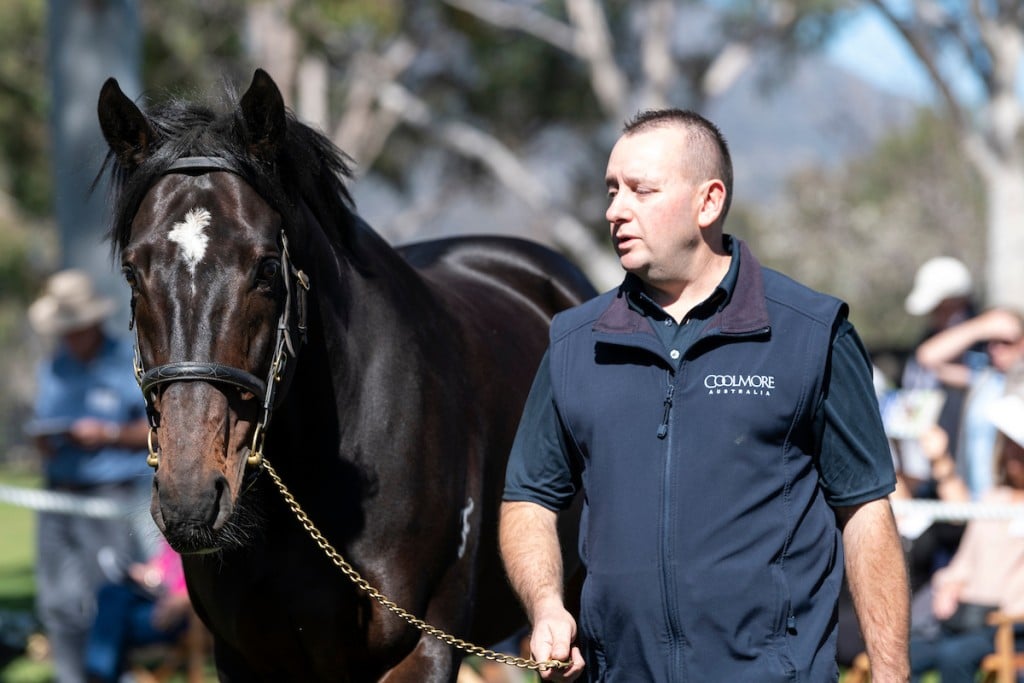 Racing in Libya has been through turbulent times, but the arrival of Golden Slipper winner Vancouver to stand at stud could herald a bright new era for the North African nation. (Photo: Supplied)
Racing in Libya has been through turbulent times, but the arrival of Golden Slipper winner Vancouver to stand at stud could herald a bright new era for the North African nation. (Photo: Supplied)
When Overpass takes his place at Randwick in this weekend’s $20 million Everest, his sire will be embarking on the next chapter of his own remarkable journey on the other side of the world.
Vancouver, the Golden Slipper-winning son of Medaglia D’Oro, who initially stood at Coolmore Australia, and then Woodside Park for the past three seasons, has arrived this week in Libya, northern Africa, taking his place at Dr Aman Ashaab’s Tripoli-based breeding outfit, Al Shaab Stud.
If the name rings a bell, it should.
In January 2020, Al Shaab made international headlines when it was savaged by Libyan militia, 59 of its horses stolen, among them six stallions. Of the latter, Australian-breds Brut Force, who was Libya’s leading sire, and the John Singleton-bred Churchill Downs were never seen again.
Dr Ashaab says Vancouver is headed to a very different Libya.
Purchased by Dr Ashaab in a package that included Ribchester, the former Haunui Stud-based son of Ifraaj, he won’t face the same threats as those of five years ago.
Though the United Nations recently cautioned on Libya’s ‘prolonged political transition’ since 2020, and the Australian government slapping a “do not travel’ warning on the country to this day, things have settled down.
Libyan racing in particular, thanks largely to Dr Ashaab, has improved out of sight.
 Dr Aman Ashaab owns Al Shaab Stud, the Libyan thoroughbred operation that will be home to Golden Slipper winner Vancouver. (Photo: Supplied)
Dr Aman Ashaab owns Al Shaab Stud, the Libyan thoroughbred operation that will be home to Golden Slipper winner Vancouver. (Photo: Supplied)
When he sits down to talk to The Straight, it is late-morning in Tripoli, and Vancouver and Ribchester are in Brussels. He is expecting them in several days, an arduous long-haul that has taken the horses from Australia (in Vancouver’s case) to New Zealand, then back to Australia via Sydney, on to Brussels and finally Tripoli.
“It’s not easy flying the horses for three days, more than 30 hours of flying, to arrive in Europe,” Dr Ashaab says.
“Next Monday they will be arriving from Brussels to Libya, which will take only three hours of flying. We are very happy to have Vancouver and Ribchester.”
At the height of the 2020 troubles, Al Shaab Stud had six stallions. Today, ahead of the new arrivals, it has only two, and one of them is the Darley-bred, Caulfield Guineas-winning hothead, Helmet.
“Helmet is also Australian and he’s an old stallion, but he’s a very nice, very strong horse, and he’s glamourous,” Dr Ashaab says, then mentions that his other stallion in residence is the Irish horse Ivawood, who won the July Stakes for Richard Hannon.
“Vancouver and Ribchester, they’re two stallions with very different bloodlines, one of them a European bloodline. They have nice records for themselves, and also nice records for the progeny. Vancouver has Group 1 and is producing a Group 1 (Overpass).”
The story behind Dr Ashaab’s purchase of the two stallions is interesting.
Initially, the pair had been sold to China and, monies received, they were flown to Auckland for export. However, blood samples returned a positive result to equine viral arteritis (EVA) in response to both horses being vaccinated against it. China requires imported horses to be tested before and after quarantine, and a negative result for EVA is non-negotiable.
Vancouver and Ribchester were not going to China.
At Magic Millions, David Chester went into action-hero mode to find new homes for the stallions. He had never done business with Dr Ashaab, and the last time Ashaab had done business in Australia was 2010, but Chester had visited Libya as a guest auctioneer in the early 2000s. He had liked the place. Within the month, Vancouver was sold to Al Shaab Stud for $150,000 and Ribchester for $100,000.
“Mr David Chester did his best with this deal,” says Dr Ashaab. “I will continue to do business with the Australian bloodline because the Australian bloodline has had very good results here in Libya.”
When The Straight caught up with Chester about the sale of Vancouver and Ribchester, the Magic Millions sales director was not happy. He had been grappling with the federal government over its refusal of a visa to Dr Ashaab, a visa that would have brought the Libyan studmaster to the Gold Coast for its two-year-old sale.
“Dr Aman has had a lot of success internationally”, Chester said. “He has a ten-year visa to the United Kingdom and buys a lot of horses at Tattersalls, but he can’t get into Australia. And he’s not the only one. For this sale, we had six visas knocked back … Mongolia, China and Libya.”
 Vancouver, the sire of Everest runner Overpass, will join the stallion roster at Al Shaab Stud in Libya. (Photo – Bronwen Healy. The Image is Everything. Bronwen Healy Photography)
Vancouver, the sire of Everest runner Overpass, will join the stallion roster at Al Shaab Stud in Libya. (Photo – Bronwen Healy. The Image is Everything. Bronwen Healy Photography)
Dr Ashaab did not take the rejection personally. Getting into Australia can be difficult and, on this occasion, it had nothing to do with his being Libyan and all to do with insufficient documents.
He said: “We have to do the visa application online because we have no Australian representative here in Libya. So I must get the visa online from Oman. I started the processing but, unfortunately, it was rejected because they said there was not enough documents for me to do business there.”
With Magic Millions’s support, he will try again for January. It’s the first time he has ever been rejected for a visa anywhere in the world.
“This did make me disappointed, but this is a procedure and I respect them for that,” he says.
On the southern banks of the Mediterranean Sea, bordering countries like Egypt, Sudan, Algeria and Tunisia, Libya has its share of challenges. Take its thoroughbred stud book, for example, on which Dr Ashaab has worked tirelessly.
For the Libyan Stud Book to be recognised, horses must have blood samples processed, but there are no laboratory facilities in Libya to do this, and transporters like DHL and FedEx won’t carry them.
To cartwheel this, members of the Libyan Horseracing Authority (LHA), of which Dr Ashaab was chairman for four years until late last year, fly to Europe with the samples packed in their luggage, and then forward them on to Ireland for testing.
It’s an illustration of the everyday difficulties that Libyan horse racing faces, and yet the picture is getting better.
The industry, despite such a large geographical spread (Libya is roughly a quarter the size of Australia), and despite the instability of civil war, is coming together in aid of big races, rich purses and invitational ambitions. In Benghazi, on the nation’s east coast, there has been a sharp improvement in racing’s outlook.
“The situation is really improving, especially in Benghazi, the second city of Libya,” Dr Ashaab says. “They have very nice investment there for a new US$200 million racecourse, and the stallions might stay in Benghazi.”
Vancouver and Ribchester, therefore, could end up at a partner stud in Benghazi, a thousand kilometres by road from Tripoli to the west. East and west Libya are ruled by two different governments, which delivers a sense that the country is forever beating back the flames of civil war.
Still, Dr Ashaab says that since the militia plundered his stud in 2020, they have come a long way. People in government are working together; racing has come under the prime ministership, not the department of agriculture. There are now around 3000 breeders in Libya.
And, at Al Shaab Stud, after the slaughter of five years ago, they have rebuilt.
“It’s not easy talking about that situation,” Dr Ashaab says. “It was very hard to lose many of our very nice horses, especially Churchill Downs, who is not back. And Backdraft, who is not back. Even our clinic, we lost many of our very expensive equipment like endoscopes, arthroscopes, even our anaesthetic machine.”
 Al Shaab Stud is rebuilding after militia ransacked the Tripoli property in 2020. (Photo: Al Shaab Stud)
Al Shaab Stud is rebuilding after militia ransacked the Tripoli property in 2020. (Photo: Al Shaab Stud)
Al Shaab Stud was, and still is, the largest thoroughbred stud in Libya. It was opened on April 1, 2000, by Dr Ashaab and his brother Radwan.
In 2020, when it was ransacked, the perpetrators acted with murderous intent. Two horses were shot on sight, and others were driven away in trucks, never to be seen again. When some were found four months later, they were in dreadful condition.
The stud’s clinic, which was the best-equipped in the country owing to Dr Ashaab (and his brother) being a qualified veterinarian, was plundered. Even the farm’s dog, Tiger, disappeared.
At the time, Dr Ashaab leapt onto social media to whip up international attention, and the outcry was loud. Despite the carnage, and the delicate peace deals since, the stud has kept on.
“There is a very bad picture still in my mind when I see the stud with a lot of blood everywhere,” he says. “It was like slaughter.”
Dr Ashaab paid a high price for it, and the scars of that day are evident in his expression when he talks about it, but Libyan breeding was put on the map because of what he and his horses endured.
It reverberated around the world, and since then, the prosperity of Libyan racing and breeding has walked hand in hand with civil peace.
Dr Ashaab isn’t a one-man band in Libya, but he has worked hard to bring about change. In a way, he has measures of George Ryder about him; a studmaster and administrator who has a vision to further the interests of racing, and the means to make things happen. Ryder was, as history reminds us, the brains behind the Golden Slipper.
Which brings us back to Vancouver, Australia’s 2015 Slipper winner, bred by John Camilleri, a winner of four of five races and a horse that retired to Jerrys Plains at a $55,000 service fee. Now he has joined Helmet and Moroccan-based Scissor Kick in the northern African hub.
Like Saudi Arabia before it and Dubai before that, could racing be looking at a new international boomtown in the decades to come?

